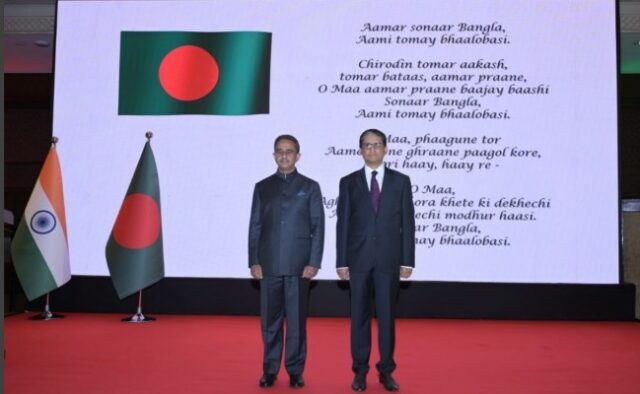
Bangladesh on Thursday underlined its commitment to improving bilateral relations and revitalising regional cooperation.
Addressing diplomats, Indian officials, and veterans of the 1971 Liberation War at the Taj Palace Hotel, Hamidullah said the caretaker government, led by Nobel Laureate Professor Muhammad Yunus, was formed in response to growing public demand—particularly from the youth—for institutional reform and inclusive governance.
“Last monsoon, our people—especially the youth—stood up, demanding reforms and a restructuring of key state institutions,” Hamidullah said. “Their voices shaped the formation of the current Interim Government.”
The celebration, typically held on March 26 to mark Bangladesh’s Independence Day, was postponed this year due to a combination of factors, including the arrival and credential presentation of the new High Commissioner to India, as well as the observance of Ramadan during that period.
India’s Minister of State for External Affairs Kirti Vardhan Singh, who attended the event as chief guest, described India-Bangladesh ties as “forged through shared experiences and sacrifices,” and called for expanding cooperation in trade, connectivity, energy and cultural exchanges.
The reception blended diplomacy with cultural and culinary expression. Guests were treated to a live showcase of traditional Jamdani sarees—celebrated for their intricate craftsmanship and recognised by UNESCO as intangible cultural heritage.
Adding a gastronomic flourish, chefs flown in from Dhaka’s iconic Fakhruddin Catering served a specially curated menu, headlined by the famed Dhakaiya Kacchi Biriyani, alongside other traditional Bangladeshi delicacies.
Hamidullah said Dhaka was committed to revitalising regional cooperation, particularly in its current role as Chair of BIMSTEC. He cited the recent transmission of 40 MW of hydropower from Nepal to Bangladesh through the Indian grid as a model of trilateral energy collaboration.
He added that bilateral trade with India continues to grow at a double-digit pace, and more than 10,000 Bangladeshi students are currently enrolled at Indian institutions.
“Our engagement is not defined by the number of MOUs or meetings,” the envoy said. “It is a living relationship that must adapt to evolving regional and global realities.”
Singh affirmed India’s readiness to deepen ties. “It is possible for Bangladesh and India to reconnect and recommit—to chart a pathway towards inter-dependent relations based on mutual trust, benefit and equity,” he said.
Both sides paid tribute to India’s role in the 1971 war and emphasised the need to carry that legacy forward. “We celebrate not just to remember the past, but to reflect on the future—as neighbours and partners in progress,” Hamidullah said.
With nearly half its population under 35, Bangladesh is at a critical juncture, he added, seeking to consolidate its democratic future while expanding regional partnerships.




